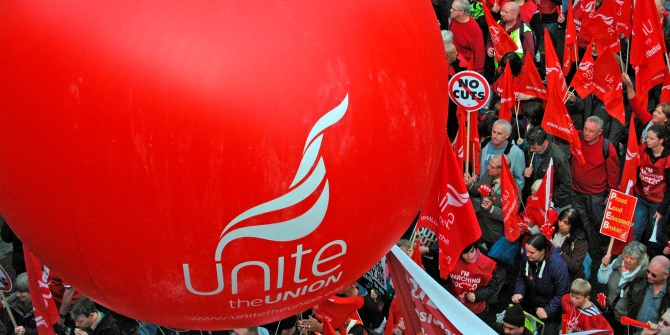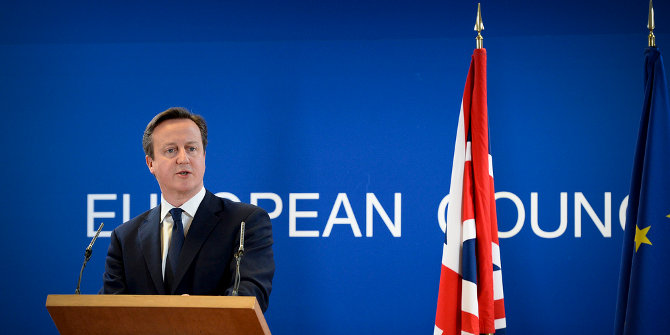 The 2017 Conservative Manifesto promised “a strong economy built on sound public finances”. In this third and final article on the political economy of that manifesto, Abby Innes explains why the Conservative Party has, over its years in government, demonstrated a poor understanding of what free markets actually require.
The 2017 Conservative Manifesto promised “a strong economy built on sound public finances”. In this third and final article on the political economy of that manifesto, Abby Innes explains why the Conservative Party has, over its years in government, demonstrated a poor understanding of what free markets actually require.
The Conservative Manifesto promises it will be the party of sound public finances, but this claim lacks credibility. The reasons are rooted in the Conservative’s ideologically driven determination to marketise the state where the necessary conditions for markets do not exist. The Academy and Free School programme illustrates the dire fiscal consequences.
With the advent of the ‘knowledge economy’, policy intervention in education is more than ever a key determinant of social equality. Nevertheless, according to the Institute for Fiscal Studies, a Conservative victory will mean a total real-term cut to per-pupil spending of around 7% over the six years between 2015–16 and 2021–22. This is a perverse policy decision. But how sound is the spending that exists? What happened when ‘quasi-markets’ – the choice and competition agenda – was implemented into secondary education?
Academies have not improved attainment. In the first report to systematically compare Local Education Authority (LEA) schools and Multi-Academy Trusts, Jon Andrews showed that the Academies group offered no systematic improvement on LEA schools and that schools from Multi-Academy Trusts were more highly represented in the worst performing, lowest 5% of schools. Department for Education (DfE) figures showed that sponsored Academies and Free Schools permanently exclude pupils at double the rate of other state secondary schools. Repeated reports show higher gaming of league tables by Academies through the use of equivalent qualifications.
The taxpayer has paid a high financial price for this lack of improvement. The DfE was unprepared for the financial implications of the accelerated roll out in 2010 and unanticipated funding needs drove over one-third of £1 billion unanticipated cost between April 2010 and April 2013. This forced the DfE to raid funds from other budgets, including £95 million intended for improving underperforming schools. Under constant National Audit Office (NAO) and Public Accounts Committee pressure, the DfE finally agreed to provide the true costs of Academies relative to LEA maintained school by June 2017 – a timeline presumably cancelled by this election. Nevertheless, the loss of economies of scale from the cessation of Local Educational Authority coordination guaranteed higher costs, and 71% of converters between September 2010 and June 2012 reported increases in costs for accountancy, finance staff, and services.
Hyper fragmented funding structures create higher transaction costs but in a bewildering twist, Trusts are allowed to make ‘related party’ payments and salaries whereby they can award contracts to a company where a director or family member has an interest. This rule contravenes several conditions for competitive markets, specifically, no interdependencies and no collusion between buyers and sellers. To allow related party payments is legalized clientelism, and they have produced repeated and predictable financial scandals. A requirement that companies providing for Academies charge only ‘the cost of their work’ was only put in place after November 2013 and its evaluation assumes monitored competitive tendering, appropriate financial knowledge, and a level of effective regulatory scrutiny that simply don’t exist. There is also a requirement for trusts to report on the extent to which they provide value for money, but the survey of annual reports says “these statements are largely meaningless.
The 2016 National Audit Office report on the sustainability of Academy schools concluded that “until more progress is made, we cannot conclude that the Department’s approach to managing the risks to schools’ financial sustainability is effective and providing value for money” These concerns are mirrored in the increasingly exhortatory tones of the Education Funding Agency’s Chief Executive’s letters to the Academy Trust Accounting Officers between 2013 and 2016. By 2016 these included a new rule that Academies adopt clear policy on whistleblowing.
In 2016 the DfE published its accounts for 2014-2015 nine months after every other department because of its internal institutional re-engineering. The NAO nevertheless found a level of “misstatement and uncertainty” in that statement that caused Amyas Morse to provide an “adverse opinion” on its “truth and fairness”: the most negative verdict possible. This continued the adverse opinion of the previous year. The NAO report warns that the rapid expansion of the Academies programme made it difficult to track not just spending but the fate of the schools physical estate. The 2014 NAO report identified three key aspects of Academy school performance that were insufficient: governance arrangements, financial management and child safeguarding.
At the heart of the case for ‘choice and competition’ agenda – conceived by New Labour as a modification of Thatcherite experiments with competition but massively extended after 2010 – was the insistence that electorates should not get hung up on traditional assumptions about means and ends. ‘Quasi-markets’ in welfare had a deeply common sense appeal: competitive provision, user choice and equality of access guaranteed through taxpayer funding would combine the best of markets and states. But this framing of ‘the players’ in a really-existing choice and competition scheme was incomplete, and hence so was the analysis brought to bear on its risks. Given the continuity of state funding and democratically mandated responsibility for the results, the initial and continuous, market for procurement is missing, namely the transactions between the state user and prospective producers.
In reality – until we vote to privatise education – the democratic state would be continuously making the market and unable to relinquish control over it. The state and education providers cannot escape their interdependencies and hence the system of incentives around schools bears no resemblance to those advocated in market theory. As soon as we start to consider the necessary procurement contract between the state user and the provider the common sense appeal of outsourcing falls apart. What contract theory tells us about the challenges facing the state buyer is that if the commodity in question is intrinsically complex, vulnerable to change in requirement, ethos of delivery and multi-consequential, and if its central element is unobserved behaviour that is hard to codify and hence monitor – education and health are classic examples – then it is intrinsically impossible to write a ‘complete contract’ i.e. one that dependably matches the interests of the producer and state-user.
Moreover, highly incomplete contracts leave the state buyer vulnerable to what contract theorists call ‘hold-up’ problems, where relationship-specific investments encourage the other party in the transaction to actively exploit the loss of bargaining power entailed by sunk costs, i.e. the money, not to mention the political capital, already spent. Incomplete contracts also leave the state-user vulnerable to damaging external effects not reflected in the original price. The practices of ‘cherry picking’ via pupil selection or exclusions become just two possibilities in a long list of potentially perfunctory or ‘satisficing’ provider behaviours at odds with government needs for consummate behaviour.
In fact, incomplete contracts with both parents and the state leave open the complete range of managerial and pedagogic practices within independently provided schools to effectively non-competitive conditions; practices that might range from ‘coasting’ to the serious neglect of human development as opposed to test scores; from asset-stripping of playing fields to non-meritocratic pay decision; and from punitive exclusion practices for disabled children to failures to support teachers in challenging environments. The regulations needed to manage and oversee what are now thousands of individual Trust contracts surpass anything required under LEA coordination, and they are arguably doomed to fail – but not before demoralising the teachers, civil servants and regulators weighed down by their proliferating requirements.
For the great champion of free markets, the Conservatives have demonstrated a remarkably poor understanding of what they actually require. And so long as they continue to insist on forcing public services into business environments where the conditions for genuine competition don’t exist they must remain a party to unsound public finance. In the meantime, nearly half of England’s teachers plan to leave the profession within the next five years.
_______
 Abby Innes is Assistant Professor of Political Economy in the European Institute, LSE.
Abby Innes is Assistant Professor of Political Economy in the European Institute, LSE.







